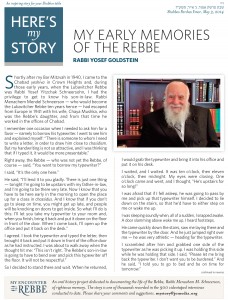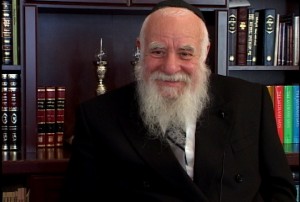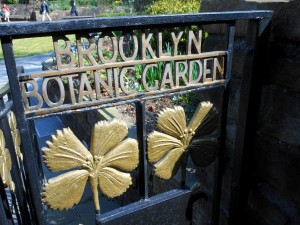My Early Memories of the Rebbe
Shortly after my Bar Mitzvah in 1940, I came to the Chabad yeshiva in Crown Heights and, during those early years, when the Lubavitcher Rebbe was Rabbi Yosef Yitzchak Schneersohn, I had the privilege to get to know his son-in-law. Rabbi Menachem Mendel Schneerson – who would become the Lubavitcher Rebbe ten years hence – had escaped from Europe in 1941 with his wife, Chaya Mushka, who was the Rebbe’s daughter, and from that time he worked in the offices of Chabad.
I remember one occasion when I needed to ask him for a favor – namely to borrow his typewriter. I went to see him and explained myself: “There is someone to whom I need to write a letter, in order to draw him close to chasidism. But my handwriting is not so attractive, and I was thinking that if I typed it, it would be more presentable.”
Right away, the Rebbe – who was not yet the Rebbe, of course – said, “You want to borrow my typewriter?”
I said, “It’s the only one here.”
He said, “I’ll lend it to you gladly. There is just one thing – tonight I’m going to be upstairs with my father-in-law, and I’m going to be there very late. Now I know that you have to be here early in the morning to open the place up for a class in chassidus. And I know that if you don’t go to sleep on time, you might get up late, and people will be knocking on doors to get inside. So what I’ll do is this: I’ll let you take my typewriter to your room and, when you finish, bring it back and put it down on the floor in front of the door. When I come back, I’ll open up the office and put it back on the desk.”
I agreed. I took the typewriter and typed the letter, then brought it back and put it down in front of the office door as he had instructed. I was about to walk away when the thought hit me: “This isn’t right. The Rebbe’s son-in-law is going to have to bend over and pick this typewriter off the floor. It will not be respectful.”
So I decided to stand there and wait. When he returned, I would grab the typewriter and bring it into his office and put it on his desk.
I waited, and I waited. It was ten o’clock, then eleven o’clock, then midnight. My eyes were closing. One o’clock came and went, and I thought, “He’s upstairs for so long!”
I was afraid that if I fell asleep, he was going to pass by me and pick up that typewriter himself. I decided to lie down on the stairs, so that he’d have to either step on me or wake me up.
I was sleeping soundly when, all of a sudden, I snapped awake. A door slamming above woke me up. I heard footsteps.
He came quickly down the stairs, saw me laying there and the typewriter by the door. And he just jumped right over me – he was very athletic – heading for the typewriter.
I scrambled after him and grabbed one side of the typewriter as he was picking it up. I was holding this side while he was holding that side. I said, “Please let me bring back the typewriter. I don’t want you to be burdened.” And he said, “I told you to go to bed and be on time for tomorrow.”
The outcome was that we both carried the typewriter into the office and put it on the desk. This was the very same typewriter that he used to type the Previous Rebbe’s letters, and I have a nice collection of some of these letters that were sent to me after I left New York – the original letters that the future Rebbe had typed.
Another memory I have from those days is the Rebbe and the future Rebbe at prayer. I stood in back as they prayed, and I noticed that the future Rebbe was watching his father-in-law’s every move – his eyes were glued to this holy man. I mentioned it to another fellow who said, “There must be something there to watch.” So I moved in closer to watch also. And when I did that, I heard something special. During the Shema prayer, the Previous Rebbe put his hand on his forehead and, when he came to the last word – Hashem Echad, “G-d is One” – he drew out the sound, the tone rising higher and higher. I remember that sound, and it remains with me to this day.
In 1943, the future Rebbe organized the first children’s parade for Lag B’Omer. It was held in the parking lot at the back of Chabad Headquarters, and he spoke to the children in Yiddish. Since there was such a big crowd, he ran over to the corner and pulled up a wooden chair to stand on, so that the children could see him.
While he spoke, I noticed that one of the windows on the second floor of 770 opened up. And I couldn’t believe my eyes – there was the Rebbe watching his son-in-law talking to the children. Now the tables were turned. It was the Rebbe who was watching him.
The Previous Rebbe stayed up there, looking out the window, for the duration of the entire talk, which was about learning Torah and doing the mitzvos. The future Rebbe used the example of Rabbi Akiva who started learning Torah when he was 40, and he told the children to remember that, no matter what happens in life, it is never too late to start.
I have so many wonderful memories from those early days. I remember one Rosh Hashanah when a big storm broke loose – there was a heavy downpour with thunder and lightning. It was time for the Tashlich ceremony which we always held at the pond in Prospect Park, but it was raining hard. What could we do – we had to march in the rain and get our nice holiday clothes soaking wet.
This we did, with the future Rebbe leading the way. When we got to Prospect Park, we found the gates locked – I guess they thought that we wouldn’t come in the rain. But that didn’t stop the Rebbe. He reached up and sprung to the top of the wall, then turned around to signal to us – “What are you waiting for?” – and he jumped down on the other side. So we followed him. The young guys helped the old guys, some ripping their pants.
Coming back, the future Rebbe led us in singing and dancing. It was one of the happiest experiences I remember, which brought new meaning to the teaching of the Rebbe Maharash: “The world may say, ‘If you can’t crawl under an obstacle, try to climb over,’ but I say, ‘Lechatchilah Ariber – At the outset, jump over!’”
Rabbi Yosef Goldstein, also known as “Uncle Yossi,” was an educator who utilized radio, audiotapes and video to inspire generations of children with his parables, stories and songs. He was interviewed in New York, in August, 2001








No Comments to “My Early Memories of the Rebbe”